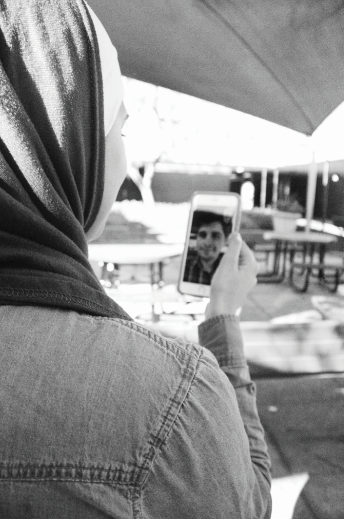Campus Affairs
KATELYN COLLEY| MARCH 8, 2018 | FEATURES
Between exchanged hoodies, warm smiles and hand-holding, there is a unique atmosphere around the seemingly complicated dating culture of Stanton College Preparatory School. Due to the rigorous academics the school has to offer, the nature of student relationships is challenged. The discussion of whether high school dating is a positive life experience or simply an academic distraction affects many Stanton students on a day-to-day basis. These issues bring up questions that affect not only the students involved, but also families, friends and students’ future academic paths.
Common among students, teachers and parents is the notion that high school dating is a hindrance to students’ academic work. The idea of maximizing time with a significant other can jeopardize schoolwork for Stanton students with an already full schedule. Any technological expectations for students to remain in contact can also lead to more distractions.
“I would rather date after high school because there would be a much more likely chance that it will become serious and committed,” said sophomore Smrithi Krishnan. “Right now, dating is a distraction that neither I or my parents feel I need in my life, especially with me focusing so much on my grades right now.”
Some parents agree teenagers are not emotionally mature enough to handle a high school relationship, as these relationships can bring about high expectations, peer pressure and unnecessary stress. As a result, Stanton students often struggle with trying to sort out their emotions in the midst of rigorous coursework, and parents may feel dating only further confuses this process.
“My daughter cannot date because I think she needs to focus on her academics,” said MSankar Krishnan, Smrithi’s father. “Now is not the right time and place because work is such a priority, so she should at least wait until college to date.”
Not only do high school students in relationships undergo internal pressures brought on by emotional factors, they must also face the inevitable changes these relationships create in their lives. One uncertainty that may cause considerable apprehension is the future of the relationship beyond graduation. High school couples are particularly susceptible to separation due to differences in college plans, careers or housing locations. Teens will choose not to date at all in high school because of these considerations, claiming it seems futile from the start.
“I personally choose not to date in high school because it’s very unlikely that such relationships are going to last beyond this emotional high school environment,” said junior Eliana Gosiker. “Even in the case of high school sweethearts, half of their relationship is defined by their teen dating years rather than a genuine, adult connection that allows you to emotionally mature.”
As if maintaining a high school relationship with academics was not difficult enough for some students, break-ups are another potential hurdle students have to face. These endings, whether foreseen or abrupt, take a significant emotional toll on adolescents who are already juggling so many things in their life.
According to a 2009 American Psychological Association article, “A break-up can initially result in negative outcomes such as depression and loneliness [and a] loss of self or sense of who they are as a person.”
These complicated and depressive moods not only affect a student’s mental and emotional health, they can also serve as a distraction from their academic careers. This is especially true when the scenario does not involve a clean, straightforward break-up, but rather a prolonged process of social and emotional detachment. Times such as these can be a major distraction to one’s daily life, especially when a student needs to focus on specific tasks. Students agree Stanton’s higher-level academics and scholarly demands often do not offer any consolation during these relationship complications, either.
“There’s not always a happy ending to relationships,” said junior James Jaro. “I once had a really bad break-up that made me feel all alone and betrayed. It definitely took a heavy toll on my emotional health.”
While fear of painful break-ups or emotional complications can lead some to believe in the futility of high school relationships, other Stanton students believe high school relationships to be a constructive and worthwhile experience. Relationships often promote feelings of contentment, belonging and comfort, all of which psychologists say are important for adolescence. Dr. Wyndol Furman, a psychology professor at the University of Denver, agreed there are many positive outcomes that can come from high school relationships.
“Romantic relationships can be significant sources of support,” said Dr. Fulman in a 2001 New York Times article on teen dating.“ [Relationships] that offer teenagers fun and companionship help them forge mature identities and offer them practice in managing emotions.”
Whether a study partner, a shoulder to cry on or someone to talk to about personal struggles, the support provided by a significant other can aid in students’ social and emotional development. Counselors and specialists agree having relationship experience in high school is overall useful for dating experimentation and learning how to set boundaries.
“I think it’s a great experience [for students] to learn about themselves, as well as their limits, strengths and weaknesses,” said guidance counselor Ms. May Ibasco. “There is a certain foundational security you find in high school relationships, which can help you with the adjustment in any future relationships, such as in college.”
Teen dating can also allow students to build lifelong social skills and explore what they are and are not comfortable with. Establishing boundaries early on can help shape teenagers into more conscientious and confident adults.
According to a 2016 UCLA psychology research report on teen dating, “Although adolescent romantic relationships may last for only a few weeks or months, these early relationships play a pivotal role in the lives of adolescents and provide a foundation for developing committed relationships in adulthood. [These positive] relationships are viewed as providing emotional support and enhancing interpersonal skills.”
In the technological era, the concept of teen dating can no longer be confined to in-person interaction. One of the most significant changes in the high school dating culture over the last few generations is the significant role of technology in relationships. Social media influences the modern dating culture in many different ways and has been vital to both bringing people together and tearing them apart. Whether through relationship posts, couples tags or biographies displaying dates and initials, social media has become a canvas for students to publicly display their affection.
“I don’t get to see my boyfriend a lot, so social media allows me to stay in touch,” said sophomore Michaela Lopez. “Overall [technology] is just a fun way to keep the relationship going."
Stanton students feel social media has played a significant role in keeping their relationship alive. Communication is thought to be an essential part of any relationship and between texting, calling and video chatting, students now have a wide variety of online options for maintaining contact with their partners. This is especially true for students who choose to date students enrolled at other Jacksonville high schools and for those who cannot always maintain face-to-face interaction.
“My girlfriend is going to college in Orlando,” said senior Cole Smith. “It’s hard because I’m not able to see her as much, but I make sure to call and use social media to help me maintain contact with her so that we can continue to be happy and grow together. I definitely think technology has a part in keeping our relationship alive.”
Although students like Smith use social media within their relationships, it is important to recognize this often creates an unrealistic, surface level goal that high school students try to attain. Media can present a faulty ideal of what these relationships should be like and the standards they must uphold.
“Whatever students see on TV or [social media] is not quite the reality,” said Ms. Ibasco. “There may be pieces of how it happens in real life, but ultimately it puts a lot of pressure on both people in the relationship to live up to the expectations seen online and in our entertainment culture.”
Dating in itself already proves to be a major distraction for many students. In recent years, technology has further magnified this hinderance, as many teens tend to depend on it to uphold their relationship. Stanton students agree it is much easier to get lost in time over text or phone than it is to hold a real-life conversation and feel that because of this, they can be easily pulled away from their schoolwork. At Stanton, students are held to high academic expectations that can cause balancing a full-time relationship to be both physically and emotionally taxing.
“I think technology can definitely be a distraction to your academics, so it is important to keep your academic priorities straight and balance these two accordingly,” said sophomore Rhiannon Hanlon. “Even if you care a lot about a person, they’re not going to get you into college, your grades are.”
Some experts agree the technology used to manage a relationship can be a distraction for a student’s studies. These distractions can come in small increments and yet still be academically harmful.
“It may just be answering quick texts or responding to or trying to resolve an argument [over the phone],” said Zoe Pfaffman, a licensed marriage and family therapist based in Jacksonville. “Regardless, these are distractions to otherwise uninterrupted studying or homework time.”
Relationships and the various effects surrounding the high school dating scene cannot be pinpointed to one circumstance or outcome. Through the differing opinions of students, parents and experts, it is evident that the complexity of the teen dating issue makes it difficult for many to find a common ground. Some find the concept futile and meaningless, while others see merit in the experience, regardless of the outcome. From establishing protective dating boundaries both in real life and online, high school is a valuable time for students to develop their own preferences concerning this complicated courtship.




